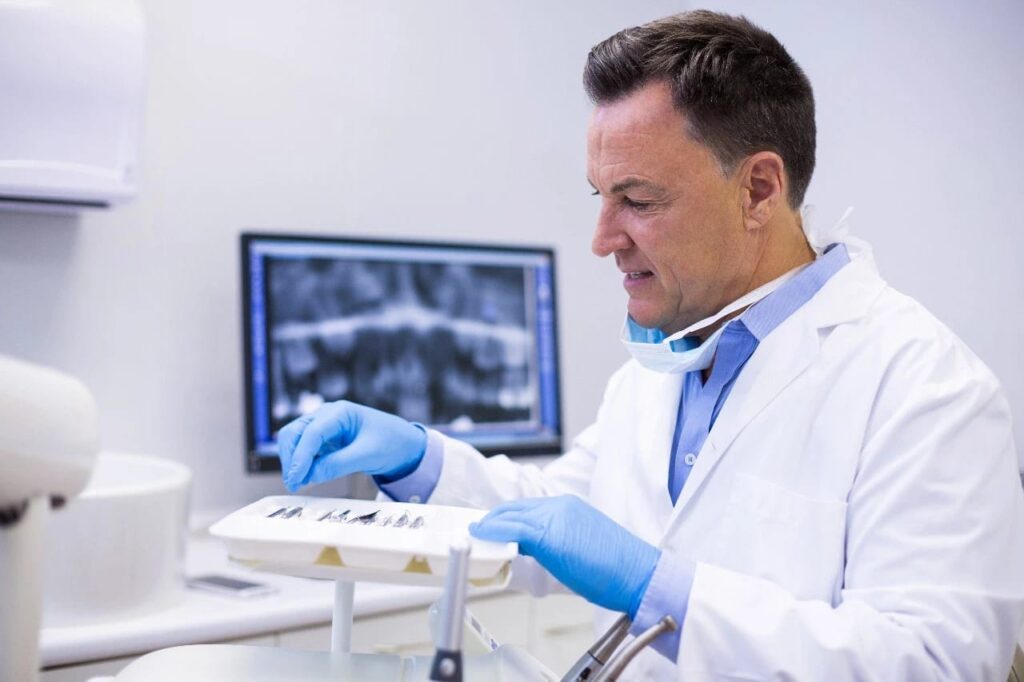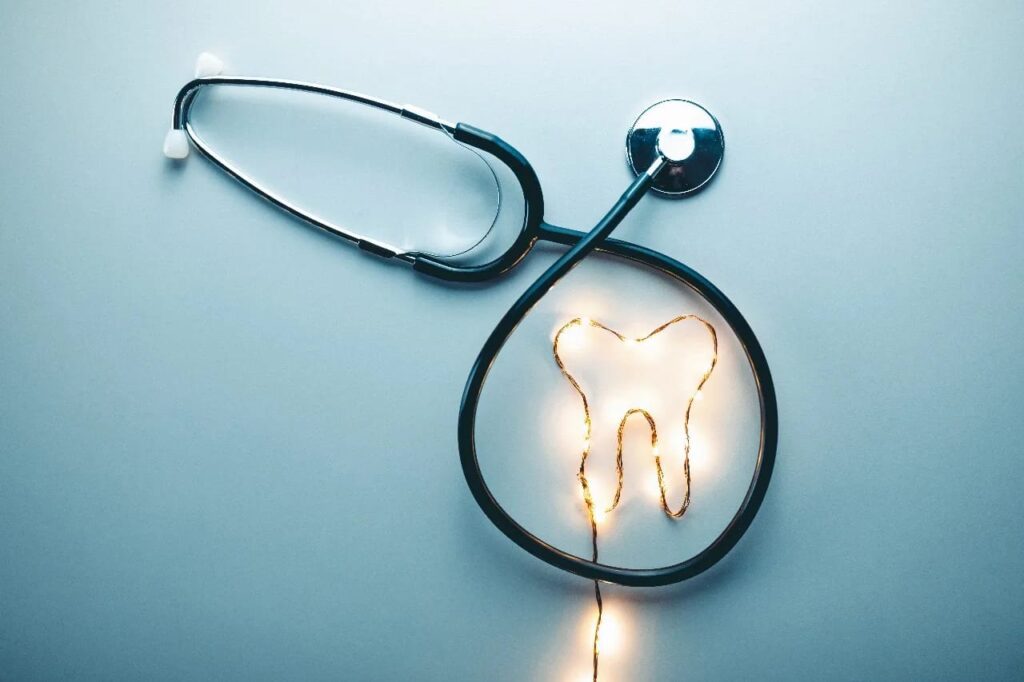A dentist specializes in oral health, providing services ranging from routine cleanings to complex procedures. They play a critical role in dental care and overall health maintenance.
Maintaining oral health is vital for overall well-being, and dentists are the professionals entrusted with this task. These medical experts diagnose, treat, and manage your entire oral healthcare needs, including gum care, root canals, fillings, crowns, veneers, bridges, and preventive education.
Regular visits to a dentist not only keep your teeth and gums in top shape but also serve as a frontline defense against more serious health issues that can manifest in the mouth. As dentists use the latest in dental technology and techniques, they can provide a more comfortable and efficient experience for their patients. Dentists require a strong foundation in biology, chemistry, and anatomy, coupled with advanced training in dental medicine to ensure the highest level of care.

The Importance Of Regular Dental Checkups
Visiting the dentist regularly is not just about getting your teeth cleaned. It’s a critical part of maintaining your overall health. Regular dental checkups are vital for preventative care and the early detection of oral health issues. By keeping up with regular appointments, you can ensure a healthy mouth and a beautiful smile.
Preventative Care
Preventative dental care is crucial to maintaining a healthy smile. Regular checkups can save you time, money, and discomfort in the long run. Each visit typically includes a thorough cleaning to remove plaque and tartar buildup that daily brushing and flossing might miss.
- Professional teeth cleaning to eliminate tartar, which can cause tooth decay and gum disease if left untreated.
- Fluoride treatments strengthen the enamel and make your teeth more resistant to decay.
- Dental sealants may be applied during visits to fill in grooves on the chewing surfaces of the teeth to prevent food particles from getting trapped and causing cavities.
Regular checkups also include a comprehensive examination of your mouth, not just to keep your teeth and gums healthy, but also to screen for any signs that may point towards other health issues.
Early Detection Of Oral Health Issues
Early detection is key in managing any form of disease, and this applies to oral health as well. During a dental checkup, dentists look for early signs of problems such as:
- Teeth grinding can lead to other issues such as TMJ or worn-down teeth.
- Early signs of gum disease, could lead to tooth loss and affect overall health if not treated.
- Signs of oral cancer are critical to identify and treat as early as possible.
Dentists use a variety of tools and technologies to detect these issues. Digital X-rays, for example, can reveal early tooth decay, impacted teeth, abscesses, and jawbone damage. If these conditions are caught early, treatments will be less invasive and more successful.
Remember – regular dental checkups are a cornerstone of a proactive approach to dental health. They are the first line of defense against numerous oral health concerns and can keep minor issues from becoming major health risks.
Finding A Qualified Dentist in Scarborough
Finding a qualified dentist in Scarborough can often feel like searching for a needle in a haystack. Your dental health is crucial, and selecting the right professional to entrust with your care is paramount. It’s not simply about the nearest or cheapest option – you want to ensure that your dentist possesses the requisite skills, knowledge, and experience to provide the best possible care. How do you sift through the myriad options and find that perfect dental healthcare partner?
Importance Of Credentials And Experience
Confirming credentials is the foundation of trust in the dentist-patient relationship. A qualified dentist should have a degree from an accredited dental school and hold current licensure. Look for board certifications or advanced training, which indicate a commitment to excellence in the field. But academic qualifications alone don’t paint the full picture – practical experience is a critical factor. A dentist with years of practice will not only have refined technical skills but also a deeper understanding of patient care, allowing them to deal more efficiently with a variety of dental issues.
Recommendations And Online Reviews
The modern patient’s journey often begins online. This is where patient recommendations and online reviews shine as a compass to guide you. A dentist with high ratings and positive feedback is a reassuring sign of reliable patient satisfaction. As part of your research:
- Examine ratings on multiple platforms such as their practice website, social media, and dedicated review sites.
- Read through the comments to gain insight into the overall patient experience, from customer service to treatment outcomes.
- Consider the number and consistency of reviews – a higher number of reviews can provide a more accurate picture.
But remember, not all reviews may be genuine. It’s important to apply critical thinking and look for patterns within the feedback provided.
The Role Of A Dentist In Maintaining Oral Health
The role of a dentist is pivotal in ensuring the health and functionality of one of the most important parts of the body: the mouth. Comprehensive oral health directly impacts overall well-being, so a dentist is much more than just a tooth expert; they are guardians of full-body health. By diagnosing, treating, and managing your entire oral healthcare needs – from gum care, root canals, fillings, crowns, and veneers, to preventive education – dentists provide the essential service of keeping your smile both beautiful and healthy.
Professional Cleanings And Oral Exams
Regular professional cleanings and oral exams are the bedrock of maintaining oral health. During these sessions:
- Dental plaque and tartar that cannot be removed by brushing and flossing alone are eliminated, preventing tooth decay and gum disease.
- Teeth receive a thorough polish, which helps remove stains and leaves the mouth feeling refreshed.
- Oral exams allow dentists to catch early signs of issues such as cavities, gum disease, and even oral cancer. Identifying problems early means simpler and more effective treatments.
These assessments are indispensable for preventing bigger health issues, and they should be a regular part of everyone’s healthcare routine.
Customized Treatment Plans For Patients
No two mouths are alike, and a skilled dentist understands the importance of personalized dental care. Creating a customized treatment plan involves:
- Thoroughly evaluating the patient’s dental health and history.
- Discuss any concerns or goals the patient has regarding their oral health.
- Devising a strategy that addresses all aspects of the patient’s dental needs, from restorative procedures to cosmetic preferences.
This tailored approach ensures that each patient receives the care that is best suited to their individual needs, thus promoting better outcomes and a healthier smile.
Understanding Common Dental Procedures
Regular dental checkups and cleanings are crucial for maintaining excellent oral health, but sometimes, teeth need extra care. Common dental procedures can range from simple fillings to more complex surgeries. By learning what each procedure involves, patients can feel more comfortable and informed when they visit their dentist. In this segment, we’ll explore the basics of various dental treatments and what they aim to achieve.
Fillings And Root Canals
Tooth decay is a prevalent issue that can lead to cavities. Dental fillings are the primary treatment for restoring the integrity and function of the tooth affected by decay. The process involves removing the decayed tooth material, cleaning the affected area, and then filling the cavity with a filling material such as gold, porcelain, a composite resin, or an amalgam alloy.
When decay advances deeper into the tooth, reaching the nerve, a more intensive procedure called a root canal may be necessary. During a root canal, the damaged or infected pulp is removed, the inside of the tooth is cleaned and disinfected and then filled and sealed with a material known as gutta-percha. Finally, a crown or a filling is usually required to rebuild the tooth’s structure and ensure a functional bite.
Teeth Whitening And Cosmetic Dentistry Options
Stains from coffee, tea, tobacco, and certain foods can diminish the brilliance of your smile. Teeth whitening procedures can restore the natural color of your teeth or even make them whiter than your natural color if desired. This process can be done at home or in the dentist’s office using bleaching gels that oxidize away stains.
Cosmetic dentistry options encompass a wide array of procedures aimed at improving the appearance of one’s teeth. Some popular options include:
- Veneers: Custom-made shells, usually of porcelain, that cover the front surface of teeth to adjust their color, shape, size, or length.
- Invisalign®: A modern alternative to traditional braces, this clear aligner system straightens teeth discreetly.
- Crowns: Often used to cover a damaged tooth or improve its appearance, crowns offer protection and strength to the tooth beneath.
- Bonding: Involves applying a tooth-colored resin to repair chipped or cracked teeth, changing the shape of teeth, or closing gaps.
Overall, these procedures not only enhance dental appearance but often contribute to improved oral health as well.
Managing Dental Anxiety
Visiting a dentist can trigger anxiety for many individuals. It’s a common hurdle in maintaining oral health, often leading to the postponement of necessary dental care. Managing dental anxiety is crucial to ensuring that patients receive the treatment they need in a comfortable and stress-free environment. Developing strategies to combat this fear is integral for both patients and dental professionals. Let’s explore some effective techniques and the significance of communication for calming those dental jitters.
Techniques For Calming Nervous Patients
Fear of the dentist can be daunting, but there are several techniques aimed at soothing nerves:
- Distraction: Providing patients with distractions such as music, television, or calming visuals can help take their minds off the procedure.
- Guided Imagery: Encouraging patients to visualize a relaxing experience can significantly reduce anxiety levels.
- Breathing Exercises: Teaching patients deep breathing techniques can help manage panic and encourage relaxation.
Aside from these, offering sedation dentistry options can also be an effective solution for those with severe anxiety. The use of nitrous oxide or oral sedatives can help a patient feel more at ease during their dental visit.
Importance Of Open Communication With The Dentist
Open communication establishes trust and helps patients feel in control of their experience:
- Encourage patients to voice their concerns and ask questions to understand their anxieties.
- Dentists should always explain procedures clearly, detailing what to expect during and after the treatment.
- Using a ‘stop signal’ allows patients to indicate when they need a break, fostering a sense of autonomy.
By fostering a dialogue where patients feel heard, dental professionals can tailor their approach to each individual, ensuring a comfortable and anxiety-free visit.
The Impact Of Oral Health On Overall Well-being
Understanding the Impact of Oral Health on Overall Well-being is crucial for maintaining a healthy lifestyle. The mouth serves as a window to the rest of the body, providing signals of general health disorders. Oral health touches every aspect of our lives but is often taken for granted. A healthy mouth enables not only nutrition of the physical body but also enhances social interaction and promotes self-esteem and feelings of well-being.
Links Between Oral Health And Systemic Diseases
The connection between oral health and systemic diseases is well-documented, revealing a symbiotic relationship where both influence each other significantly. Oral conditions can affect the body as a whole and, conversely, systemic diseases frequently have oral manifestations:
- Gum disease (periodontitis) has been linked to cardiac conditions such as heart disease and stroke.
- Research suggests a tie between poor oral health and respiratory issues such as pneumonia, especially in elderly populations.
- There’s a notable association between diabetes and periodontal health, with diabetes increasing the risk for gum disease and gum disease potentially affecting blood glucose control.
Promoting optimal oral health, therefore, becomes a critical component in preserving systemic health and managing chronic diseases.
Importance Of A Healthy Mouth For Overall Quality Of Life
A healthy mouth is indispensable for maintaining overall quality of life. The ability to chew and swallow food is essential for obtaining the necessary nutrients for good health. Moreover, a healthy mouth also plays a pivotal role in communication and affects social interactions and self-esteem. Consider the following aspects:
- Speech: Oral health impacts the ability to speak clearly and confidently.
- Aesthetics: A bright smile enhances appearance and fosters social engagement.
- Comfort: Freedom from a toothache, gum diseases, and oral infections is crucial for day-to-day comfort.
Maintaining a daily routine of brushing, flossing, and regular dental check-ups, combined with professional cleanings, is paramount. These practices not only keep your mouth in peak condition but contribute to the full spectrum of physiological wellness.
Conclusion
Finding a reliable dentist in Scarborough is crucial for both your oral health and overall well-being. Remember, regular check-ups are the key to a bright, healthy smile. Let the expertise of a trusted professional guide you to dental nirvana. Keep smiling — your dentist is there to ensure it’s a radiant one!






